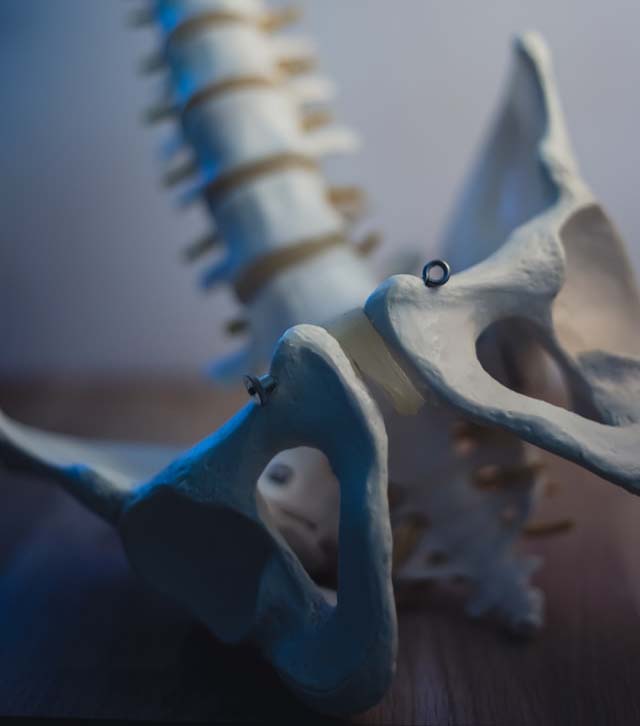Physiotherapy for Bowel Incontinence
Bowel dysfunction hurts the quality of life. If you or your loved one has this issue, you can visit OneRehab multispecialty center for comprehensive bowel incontinence therapy.

What is Bowel Dysfunction?
Bowel dysfunction is also known as bowel incontinence, referring to the loss of bowel control. The pelvic floor muscles play a significant role in normal bowel function. These muscles keep us from leaking stool and gas by having voluntary control of the anal sphincter. If you experience continuous gastrointestinal distress, it can affect the pelvic muscles. Pelvic floor physiotherapy helps patients with bowel dysfunction regain normal function.

The Pelvic Floor Anatomy
Pelvic floor dysfunction condition affects the ability to relax and coordinate pelvis muscles when urinating correctly or during a bowel movement. Women with this condition can feel pain when having sex. For men, the condition can lead to erectile dysfunction.
Many people do not know the important role the pelvic floor plays. First, the pelvis hosts the bladder, uterus for ladies, and prostrate for men, rectum, and pelvic muscles. These muscles provide support to these organs keeping everything in place.
The muscles wrap themselves around the pelvic bones to provide support. Additionally, they reinforce the support by some of the other muscles forming a sling around the rectum. When you go for pelvic floor bowel dysfunction physical therapy, the therapist will focus on the following organs.
- The bladder: The pouch that holds the urine
- The uterus and the vagina for women
- The rectum is the area at the end of the large intestines that stores solid waste.
- The Prostrate for men
Normally, people can go to the bathroom by tightening the body and relaxing the pelvic floor muscles. However, when the pelvic floor is affected, it leads to dysfunction. The body causes the muscles to tighten instead of relaxing as they should. As a result, you have:
- Trouble during bowel movement
- Leaking urine and stool
- Incomplete bowel movement
Schedule an appointment today
to see why our family of stroke experts can help you and your family on your path to independence.
What Causes Bowel Dysfunction?
Several muscles such as the pelvic, rectum, and sphincter work alongside the nervous system guaranteeing normal bowel movement. When one or more of these body parts fails to work correctly, the result is bowel incontinence. Some of the causes of this dysfunction include:
- Vaginal childbirth
- Some foods
- Bowel surgery complication
- constipation
- Abuse of laxatives
- Diarrhea
- The inability for the rectum to stretch
- Damage to the nerves
- Hemorrhoids
- Cancer radiation treatment
- Rectum tumors
- Mental or physical disability
- Rectal prolapse
- Vaginal prolapse
Certain factors such as frequent diarrhea, difficult delivery, nervous system disease, or poor health can put you at risk of getting the condition. If you have experienced the inability to get to the bathroom in time, hold gas, frequent leakage, and silent feces leakage when doing an activity, you need rehabilitation. We provide pelvic floor exercises after evaluation to help rebuild pelvic muscle strength.
Signs and Symptoms of Pelvic Floor Dysfunction
Are you wondering if you have pelvic floor dysfunction? You may experience various symptoms, and if you notice the following issues, you need to see a healthcare provider.
- A need to use frequently visit the loo. Additionally, you may experience the need to ‘force it out’ during a bowel movement. You may also start and stop severally.
- Constipation or strain during your bowel movement.
- Pushing or straining so hard as you void your bowels. Also, you may need to change the position to eliminate stool.
- Incontinence or leaking urine
- Painful urination
- Experiencing pain in the lower back when there is no other problem
- Having an unending pain in the genitals, pelvic region, genitals, or rectum with or without voiding the bowels.

Bowel Incontinence Treatment
Bowel incontinence hurts your lifestyle, work-life, and self-esteem. The good news is that the condition is treatable. Patients with the condition can take treatments to help improve the symptoms. In some cases, surgery can help correct the problem. Surgery is recommended for patients who need to remove hemorrhoids, sphincter replacement, or repairing the prolapsed rectum.
Pelvic physical therapy also helps manage and treat the condition effectively. At OneRehab, you will meet with our qualified professionals for a thorough examination. The goal is to determine the best treatment option. With our pelvic physiotherapists, you start on exercises that help you strengthen the muscles.
Additionally, the treatment revolves around helping you develop regular bowel movements. We also have several educational sessions with correct dietary advice and lifestyle changes to help improve the symptoms. If you have gone through surgery, physical therapy for the pelvis also enables you to regain muscle strength and improves your recovery.
Pelvic floor physical therapy exercises can also help address this condition. The following are some of the techniques that the physical therapist will use for bowel dysfunction.
Biofeedback
It is one of the leading pelvic floor physical therapy methods that help treat bowel incontinence. Biofeedback is not a painful technique and retrains the pelvic muscles. The physical therapist can use special sensors and video to monitor the pelvic floor muscles as you try to relax and clench them. With the feedback received, you can improve muscle coordination through various exercises.
Exercises
Apart from using biofeedback, the therapist also combines physical therapy exercises to improve functionality. After conducting a thorough physical examination, we determine which muscles are tight, helping you exercise them and regain lost function. The exercises help regain coordination between your lower back muscles, the pelvic floor, and the pelvis.
Relaxation Techniques
With the help of a physical therapist, you can learn some relaxation techniques. They can include warm baths, yoga, acupuncture, and exercises.
What to Expect on Your First Bowel Incontinence Therapy
The first visit focuses on evaluation. The physiotherapist will assess your nerves, skeleton, and muscles to find out how they function together. Once the assessment is complete, we create a personalized treatment plan based on the findings. The pelvic floor physical therapist will then discuss the plan with you as you create treatment goals.
The treatment plan can involve neuromuscular re-education, which helps retrain the pelvic muscles. In some cases, we can use manual techniques, especially when improving scar tissue mobility. Biofeedback and electrical stimulation are other forms of treatment that our unmatched pelvic health physiotherapists employ during treatment.
If you or your loved one struggles with bowel incontinence, you can visit us for a thorough check-up. We have the best team of physical therapists to help retrain the pelvic floor muscles to regain normal function.
OneRehab | Richardson
1761 International Pkwy Suite 135, Richardson, TX 75081, United States
OneRehab | Dallas
6080 N Central Expy #125 Dallas, TX 75206
Email Us
info@onerehab.com
Call Us
972 845 7875
Working Hours
M - F 7:00 AM – 7:00 PM
Sat 8:00 AM – 2:00 PM



